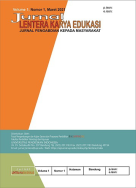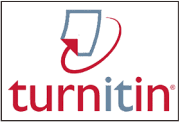Pengembangan dan Implementasi E-Module Interaktif untuk Pembelajaran Inventori bagi Guru Produktif pada Program Keahlian Teknik Logistik SMKN 1 Garut
Abstract
Full Text:
PDFReferences
Abele, E., Metternich, J., Tisch, M., Chryssolouris, G., Sihn, W., ElMaraghy, H., Hummel, V., & Ranz, F. (2015). Learning factories for research, education, and training. Procedia CIRP, 32(Clf), 1–6. https://doi.org/10.1016/j.procir.2015.02.187
Albashiry, N.M. et al. (2015). Improving curriculum development practices in a technical vocational community college: examining effects of a professional development arrangement for middle managers. The Curriculum Journal, Vol. 26, No. 3, 425-451. http://dx.doi.org/10.1080/09585176.2015.1040041
Alipour, P., & Newton, K. (2019). Development of Curriculum in Technology-related Supply Chain Management Programs. 126TH Annual Conference & Exposition ASEE.
Bekri, R. M., Ruhizan, M. Y., Norazah, M. N., Norman, H., Nur, Y. F. A., & Ashikin, H. T. (2015). The Formation of an E-portfolio Indicator for Malaysia Skills Certificate: A Modified Delphi Survey. Procedia - Social and Behavioral Sciences, 174, 290–297. https://doi.org/10.1016/j.sbspro.2015.01.660
Chen, W. & Li, G. (2016). Research of Logistics Engineering Training Mode based on School-Enterprise Cooperation. 4th International Education, Economics, Social Science, Arts, Sports and Management Engineering Conference.
Engelbrecht, M. et al. (2017). Relevance for work in the Western Cape tourism industry of the National Certificate Vocational in tourism education at TVET colleges. Industry and Higher Education, Vol. 31(5) 328–334. doi: 10.1177/0950422217724050
Karia, N. (2019). Halal Logistics: Practices, Integration and Performance of Logistics Service Providers. Journal of Islamic Marketing. doi: 10.1108/jima-08-2018-0132
Khaled, A., Gulikers, J., Biemans, H., van der Wel, M., & Mulder, M. (2014). Characteristics of hands-on simulations with added value for innovative secondary and higher vocational education. Journal of Vocational Education and Training, 66(4), 462–490. https://doi.org/10.1080/13636820.2014.917696
Long, S. (2010). AC 2010-436: Building Communication Skills in Supply Chain Management and Facility Logistics Curriculum Through Multi-Institutional Virtual Teaming. American Society for Engineering Education.
Marinov, M & Fraszczyk, A. (2014). Curriculum Development and Design for University Programmes in Rail Freight and Logistics. Procedia - Social and Behavioral Sciences 141, 1166 – 1170. doi: 10.1016/j.sbspro.2014.05.198
McKinnon et al. (2017). Logistics Competencies, Skills, and Training, a Global Overview. A World Bank Study. World Bank Group. doi: 10.1596/978-1-4648-1140-1
Niino, T. & Koppel, O. (2015). Logistics Systems Engineer – Interdisciplinary Competence Model for Modern Education. iJEP ‒ Volume 5, Issue 2. http://dx.doi.org/10.3991/ijep.v5i2.4578
Ozment, J. & Keller, S.B. (2011). The Future of Logistics Education. Transportation Journal, Vol. 50, No. 1, pp. 65-83. doi: 10.5325/transportationj.50.1.0065
Pasek, Z.J., & Pawlewski, P. (2019). Evolution of an integrated, project-based logistics engineering curriculum. Proceedings 2019 Canadian Engineering Education Association (CEEA-ACEG19) Conference.
Peraturan Presiden Republik Indonesia No. 26 Tahun 2012 tentang Cetak Biru Pengembangan Sistem Logistik Nasional Website Resmi Kementrian Pendidikan dan Kebudayaan: pddikti.kemendikbud.go.id diakses pada tanggal 9 Maret 2021 pukul 20.00 WIB
Reeve, E. M. (2016). 21St Century Skills Needed By Students in Technical and Vocational Education and Training. Asian International Journal of Social Sciences, 16(4), 65–82. https://doi.org/aining (TVET). Asian International Journal of Social Sciences, 16(4), 62 – 74. https://doi.org/10.29139/aijss.20160404
Samal, S.S. and Bharati, A., (2019). Gaps in engineering education with a categorical analysis on nanotechnology in India. Materials Today: Proceedings, 10, pp.121-135.
Sari, Z., (2013). A new curriculum for manufacturing & industrial engineering and engineering management for BS and MS degrees. Procedia-Social and Behavioral Sciences, 102, pp.560-567.
Schlingensiepen, J., (2014). Competence driven methodology for curriculum development based on requirement engineering. Procedia-Social and Behavioral Sciences, 141, pp.1203-1207.
SDGS BAPPENAS. (2024). Pendidikan berkulitas. https://sdgs.bappenas.go.id/17-goals/goal-4/. Diakses pada 18 Maret 2024 pukul 08.34 WIB
Thai, V.V. (2012). Competency requirements for professionals in logistics and supply chain management. International Journal of Logistics · April 2012. doi: 10.1080/13675567.2012.694859
DOI: https://doi.org/10.17509/lekaedu.v4i3.74478
Refbacks
- There are currently no refbacks.

This work is licensed under a Creative Commons Attribution-ShareAlike 4.0 International License. View My Stats









